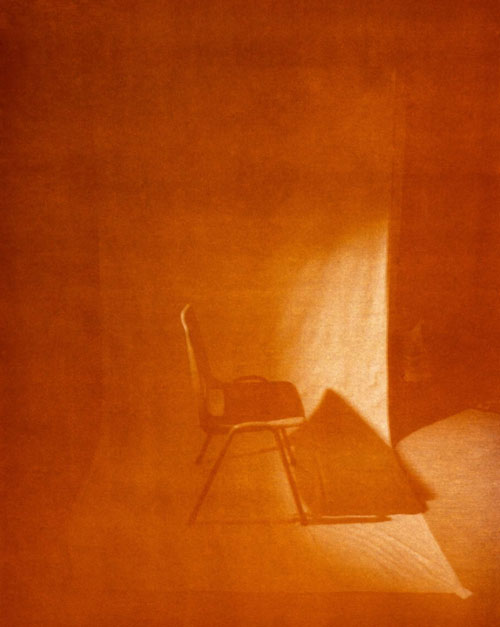Galerie Caroline O’Breen is glad to present a Young Talent exhibition showing works by Eliza Bordeaux, Naomi Moonlion, Hagar Schuringa. The exhibition features such experimental techniques as anthotype, silkscreen in combination with riso printing, and a variety of photography-based art like quilt and sculpture.

Eliza Bordeaux, Ready or Not, 2023 | Turmeric anthotype on watercolour paper | Framed in wood with museum glass | 76 x 55 cm | Ed. 3 + 1 AP
Eliza Bordeaux
Through her experimental approach to documentary photography, Eliza Bordeaux (NL, 1992) offers insight into the social significance of cultural phenomena and how they’re influenced by wider socio-economic choices. Her works, which often touch on themes of migration, memories, context, and family, reveal the ongoing influence of the colonial past over contemporary cultural perceptions and imagery.
Her latest research L’atelier Héterotopie, inspired by Michel Foucault’s philosophical concept of heterotopia, is set in an asylum center in Rijswijk where Eliza moved her studio to and established a photo club. The exhibition features work created using the anthotype process. With this method, the images are captured by using the photosensitive qualities of plants – in this case, the medicinal emigrated turmeric. The work is steeped in symbolism: the long wait for the turmeric prints, which takes months and whose results are unpredictable, symbolizes the waiting times of asylum seekers in the Netherlands.

Naomi Moonlion, The Circle is Opening, 2023 | Art quilt with sublimation printed images | Satin, silk, velvet, cotton, polyfill | 190 x 150 cm | Unique
Naomi Moonlion
Naomi Moonlion (NL, 1997; they/them) is a non-binary artist, Jewish witch and writer who creates interdisciplinary art projects aiming to turn utopian and political fantasies into reality. Their work explores identity politics, belonging, and community building through a queer and spiritual lens. By sculpting fantastical worlds using photography, performance, video, installation, and crafted objects and creatures, Moonlion hopes to offer a moment of slowness and belonging – providing an antithesis to the capitalist rush.
Their project Vessels of Home seeks moments of belonging through the creation of rituals, artifacts, and myths that weave together past, present, and future. By sharing their imaginations with the audience, they urge people to relate to their humanness together, to start to experience interbeing. The quilt represents the slow building of stories, culminating in a web of ancestral history. In their work, Moonlion is looking for an understanding of horizontal transcendence. How can we sustain a world where humans stand equal to blades of grass, and where identity and institution no longer hold all power?

Hagar Schuringa, Pink Noise, 2023 (installation view) | Silkscreen | 110 x 73 cm (each) | Edition of 3
Hagar Schuringa
Hagar Schuringa (NL, 1996) is a visual artist who explores the ever-changing landscape and how we, as individuals, relate to it. For her, a starting point for making work is often questions about the physical space, without unambiguous answers. Based on 10 vintage photographs of Chamonix Mont-Blanc from the 50s, the series Pink Noise collectively depicts the agility of the alpine landscape. The title references the naturally occurring frequencies in sound, such as the sound of waterfalls or the tide of the sea, emphasizing the interconnectedness of the environment.
In the 70 years that have passed since the original photos were for sale as souvenirs, the alpine region has changed dramatically as a result of tourism and climate change. The slumbering movement of the mountain chain becomes visible in the layers in which Schuringa builds up her images. The artist uses a variety of techniques to deconstruct photographs, such as blowing up small fragments or cutting out parts of the landscape, to highlight the dynamic nature of the environment. Schuringa’s work invites to contemplate a human relationship with the environment and our role in shaping its future.

